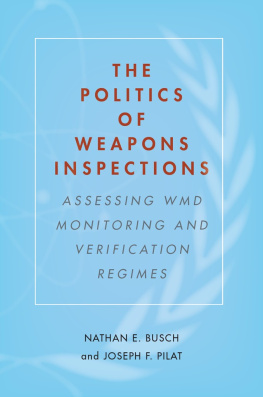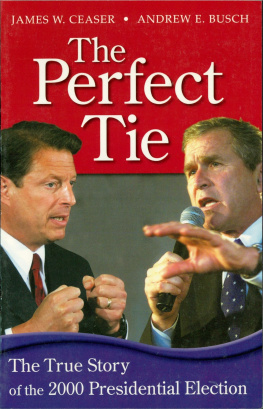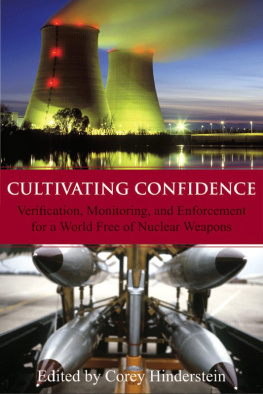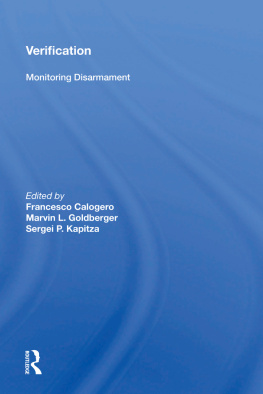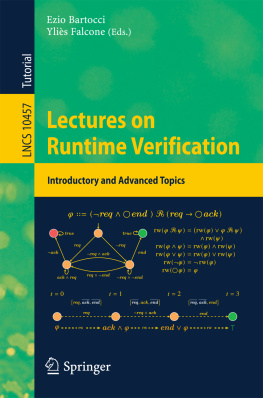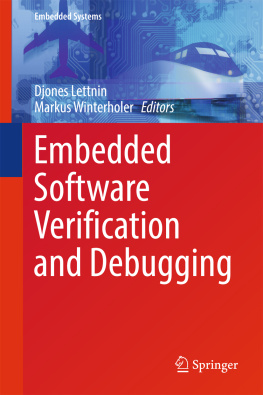Stanford University Press
Stanford, California
2017 by the Board of Trustees of the Leland Stanford Junior University. All rights reserved.
No part of this book may be reproduced or transmitted in any form or by any means, electronic or mechanical, including photocopying and recording, or in any information storage or retrieval system without the prior written permission of Stanford University Press.
The authors thank Christopher Newport Universitys Center for American Studies and its donors for supporting the research and publication of this book.
Library of Congress Cataloging-in-Publication Data
Names: Busch, Nathan E., author. | Pilat, Joseph F., author.
Title: The politics of weapons inspections : assessing WMD monitoring and verification regimes / Nathan E. Busch and Joseph F. Pilat.
Description: Stanford, California : Stanford University Press, 2017. | Includes bibliographical references and index.
Identifiers: LCCN 2016029020 (print) | LCCN 2016030198 (ebook) | ISBN 9780804797436 (cloth : alk. paper) | ISBN 9781503601604 (pbk : alk. paper) | ISBN 9781503601628 (ebook)
Subjects: LCSH: Weapons of mass destruction. | Nuclear arms controlVerification. | Chemical arms controlVerification. | Biological arms controlVerification. | DisarmamentOn-site inspection.
Classification: LCC U793 .B87 2017 (print) | LCC U793 (ebook) | DDC 327.1/745dc23
LC record available at https://lccn.loc.gov/2016029020
Printed in the United States of America on acid-free, archival-quality paper.
Typeset at Stanford University Press in 10/14 Minion.
The POLITICS of WEAPONS INSPECTIONS
Assessing WMD Monitoring and Verification Regimes
NATHAN E. BUSCH
JOSEPH F. PILAT
STANFORD SECURITY STUDIES
An Imprint of Stanford University Press
Stanford, California
For LIZ and MELINDA
Contents
Acknowledgments
We wish to thank a number of organizations and individuals who made this project possible. First, we would like to thank Christopher Newport Universitys Center for American Studies and its donors, as well as the Dean of the College of Social Sciences, for supporting the research and publication of this book. Thanks also to the Los Alamos National Laboratory for providing research space and other support.
We wish also to acknowledge the enthusiastic support and hard work in researching and editing by the CAS Junior fellows, Cameron Baxter, Ben Coffman, Galen Creekmore, Dani Crowley, Ryan LaRochelle, Ali Nayyef, Zachary Pereira, Bianca Rumbaugh, Nathan Sieminski, and Oliver Thomas. The editorial staff at Stanford University Press, including Geoffrey Burn, Alan Harvey, Anne Fuzellier Jain, and John Feneron, offered helpful suggestions and made the editing process seamless. The insightful comments by reviewers also strengthened the finished product.
Finally, we wish to extend a special thanks to our families for their indefatigable support, love, and encouragement.
The views expressed in this book are our own and not those of the Los Alamos National Laboratory, the National Nuclear Security Administration, or the Department of Energy.
Abbreviations
| ABACC | Brazilian-Argentine Agency for Accounting and Control of Nuclear Materials |
| ANC | African National Congress (South Africa) |
| AP | Additional Protocol |
| APS | American Physical Society |
| BW | Biological Weapon |
| BWC | Biological Weapons Convention |
| CBM | Confidence-Building Measures |
| CBW | Chemical and Biological Weapons |
| CCHF | Congo Crimean Hemorrhagic Fever |
| CD | Conference on Disarmament |
| CISAC | Committee on International Security and Arms Control |
| CNS | Center for Nonproliferation Studies (U.S.) |
| CTBT | Comprehensive Test Ban Treaty |
| CW | Chemical Weapon |
| CWC | Chemical Weapons Convention |
| DIQ | Design Information Questionnaire |
| DNI | Director of National Intelligence (U.S.) |
| EURATOM | European Atomic Energy Community |
| FEP | Fuel Enrichment Plant (Iran) |
| FFCD | Full, Final, and Complete Declaration |
| FMCT | Fissile Material Cutoff Treaty |
| HEU | Highly Enriched Uranium |
| HWPP | Heavy-Water Production Plant (Iran) |
| IAEA | International Atomic Energy Agency |
| IFMS | Integrated Facility Monitoring System |
| INFIRC | Information Circular |
| INMM | Institute for Nuclear Materials Management |
| ISG | Iraq Survey Group |
| ISIL | Islamic State in Iraq and the Levant |
| ISIS | Institute for Science and International Security (U.S.) |
| JCPOA | Joint Comprehensive Plan of Action |
| KEDO | Korean Peninsula Energy Development Organization |
| LEU | Low-Enriched Uranium |
| MC&A | Material Control and Accounting |
| MNSR | Miniature Neutron Source Reactor (Syria) |
| MOX | Mixed Oxide |
| MPC&A | Material Protection, Control, and Accounting |
| MUF | Materials Unaccounted For |
| NBC | Nuclear, Biological, and Chemical |
| NDA | Nondestructive Assay |
| NGOs | Nongovernmental Organizations |
| NGSI | Next Generation Safeguards Initiative |
| NLD | National League for Democracy (Myanmar) |
| NMD | National Monitoring Directorate (Iraq) |
| NNWS | Nonnuclear-Weapon State |
| NPR | Nuclear Posture Review |
| NPT | Nuclear Nonproliferation Treaty |
| NTM | National Technical Means |
| NWFW | Nuclear-Weapon-Free World |
| NWS | Nuclear-Weapon State |
| OIF | Operation Iraqi Freedom |
| OPCW | Organization for the Prohibition of Chemical Weapons |
| PFEP | Pilot Fuel Enrichment Plant (Iran) |
| PMDA | Plutonium Management and Disposition Agreement |
| PMDs | Possible Military Dimensions |
| PNIs | Presidential Nuclear Initiatives |
| R&D | Research and Development |
| RRL | Roodeplaat Research Laboratories |
| SADF | South African Defence Force |
| SCR | Security Council Resolution |
| UF6 | Uranium Hexafluoride |
| UN | United Nations |
| UNIDIR | UN Institute for Disarmament Research |
| UNMOVIC | UN Monitoring Verification and Inspection Commission |
| UNSC | UN Security Council |
| UNSCOM | UN Special Commission (on Iraq) |
| WAES | Wide-Area Environmental Sampling |
| WMD | Weapons of Mass Destruction |
Introduction
On July 14, 2015, U.S. president Barack Obama announced what he described as an historic deal that was designed to resolve the ongoing crisis over Irans nuclear program. The Iranian nuclear crisis, which had lasted well over a decade, was sparked by revelations in 2002 and 2003 that Iran had constructed a covert uranium enrichment facility at a site called Natanz, was building a heavy-water production plant at a site called Arak, and had stated that it planned to construct a heavy-water reactor at the Arak site as well. These facilities raised significant international concerns, since they could be used to produce highly enriched uranium (HEU) and plutonium, both key ingredients for a nuclear bomb. These concerns intensified following reports by the International Atomic Energy Agency (IAEA) stating in November 2003 that Iran had been conducting covert nuclear activities for nearly twenty years. In the years following these revelations, and in violation of UN Security Council (UNSC) Resolutions, Iran continued to press forward with its nuclear program, which many suspected to be part of a nuclear-weapon program, installing nearly twenty thousand centrifuges, producing a significant stockpile of enriched uranium, and nearing completion of the heavy-water reactor at Arak.

